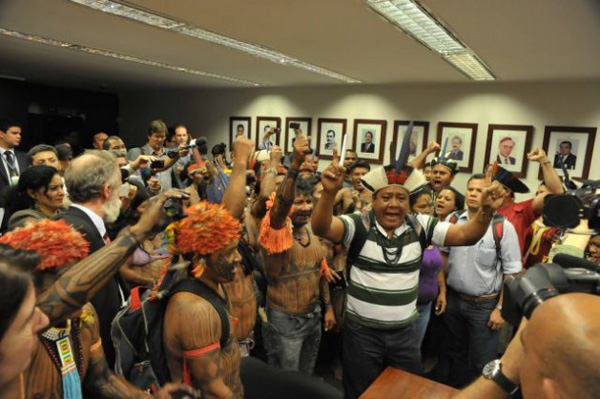
Mundurukú chiefs and warriors protest in Brazil’s lower house of Congress Tuesday Dec. 10, 2013. Photo courtesy of Luis Macedo/Acerv
Indigenous communities in Brazil have taken the unusual step of demarcating their own land — without the approval of the Brazilian government — in a bid to block two dams they say threaten their territory and traditional livelihoods, report International Rivers and Amazon Watch, advocacy groups that are fighting the projects.
Last week the Munduruku people annexed the 178,000-hectare Sawré Muybu territory after authorities failed to recognize their claims despite a report from FUNAI, Brazil’s indigenous affairs agency, confirming the status of the land as traditional indigenous territory.
“Under intense pressure from the Rousseff administration, FUNAI and the Ministry of Justice have refused to officially publish the report, stalling demarcation,” said the non-profits in a statement. “Lacking formal recognition, this indigenous territory remains highly vulnerable to dam building, illegal land-grabs, mining and logging.”
A judge has since given FUNAI 15 days to release the report.

Selection of dams planned in the Tapajós watershed. Courtesy of Dams in Amazonia
At the center of the controversy is a plan to build two dams on the Tapajós River. The Brazilian government aims to build several dams in the Tapajós watershed, which is has some of the Amazon’s least-tamed rivers.
Environmentalists and indigenous leaders say the two dams in question, the São Luiz do Tapajós and Jatobá, would cause significant damage to the Tapajós, including flooding forest areas, disrupting fish migrations, and facilitating deforestation.
The Munduruku are demanding that the Brazilian government recognize their rights before proceeding any further on the dams.
“The government does not want to demarcate [Sawré Muybu] because it will obstruct the hydroelectric dams that they want to build on our river,” said the Munduruku via a statement translated by International Rivers and Amazon Watch. “Since the government won’t assume its responsibility, we determined to do it ourselves.”

Google Earth image showing the location of the Jatoba dam.
Brazil is in the midst of a dam building spree across the Amazon basin, with hundreds of projects either under or planned domestically and in Bolivia, Peru, and Ecuador. Ecologists warn that the location and extent of dams could disrupt fish migration and nutrient flows across the massive watershed, with potential knock-on effects for Earth’s largest rainforest.







